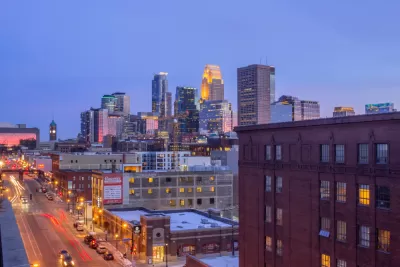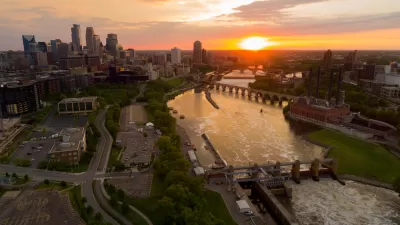Surveying the history of neighborhood rebranding in Minneapolis is like taking a tour of post-recession redevelopment.

There have been plenty of misfires in addition to one big success story when it comes to efforts to rebrand neighborhoods around the city of Minneapolis, according to an article by Jessica Lee.
Lee commences this survey of Minnesota recent neighborhood rebranding history with the example of one building, actually, a 48-unit apartment complex at the intersection of Chicago Avenue and Lake Street and the first development of its kind in that area.
According to Lee, "the project included a feature that has also become an increasingly common element of new development in Minneapolis: a new name, one not only intended to identify the building, but rebrand its surroundings. The building at 811 East Lake Street, in the heart of the city’s Latino neighborhoods, has been christened SoPHI' for south of Phillips."
While that building isn't yet ready for residents, it does stand as the most conspicuous of many obvious signs of change in the neighborhood. Still, a local source admits, no is walking around calling the neighborhood SoPHI.
There is one especially prominent example of a neighborhood rebranding catching on in Minneapolis: North Loop, described by Lee as "by far the most successful example of a neighborhood rebrand in Minneapolis." Forbes called it one of the country's best hipster neighborhoods.
The question posed by lee, then, is "why do some rebranding efforts in Minneapolis work — while so many others do not? "
For an answer, Lee turns to Chris Lautenschlager, who leads the Nicollet Island-East Bank Neighborhood Association in addition to the Marcy-Holmes Neighborhood. In Lautenschlager's opinion, "[o]ne-off ideas by developers or business leaders with big marketing campaigns often fail," while "names that fit with the community — or ones that residents think of themselves — seem to stick."
FULL STORY: From WeDo to East Town, why so many neighborhood branding efforts in Minneapolis go up in smoke

Planetizen Federal Action Tracker
A weekly monitor of how Trump’s orders and actions are impacting planners and planning in America.

Maui's Vacation Rental Debate Turns Ugly
Verbal attacks, misinformation campaigns and fistfights plague a high-stakes debate to convert thousands of vacation rentals into long-term housing.

San Francisco Suspends Traffic Calming Amidst Record Deaths
Citing “a challenging fiscal landscape,” the city will cease the program on the heels of 42 traffic deaths, including 24 pedestrians.

Defunct Pittsburgh Power Plant to Become Residential Tower
A decommissioned steam heat plant will be redeveloped into almost 100 affordable housing units.

Trump Prompts Restructuring of Transportation Research Board in “Unprecedented Overreach”
The TRB has eliminated more than half of its committees including those focused on climate, equity, and cities.

Amtrak Rolls Out New Orleans to Alabama “Mardi Gras” Train
The new service will operate morning and evening departures between Mobile and New Orleans.
Urban Design for Planners 1: Software Tools
This six-course series explores essential urban design concepts using open source software and equips planners with the tools they need to participate fully in the urban design process.
Planning for Universal Design
Learn the tools for implementing Universal Design in planning regulations.
Heyer Gruel & Associates PA
JM Goldson LLC
Custer County Colorado
City of Camden Redevelopment Agency
City of Astoria
Transportation Research & Education Center (TREC) at Portland State University
Jefferson Parish Government
Camden Redevelopment Agency
City of Claremont




























